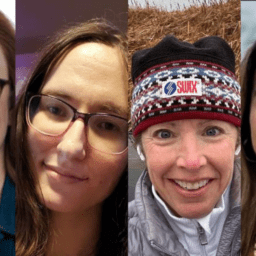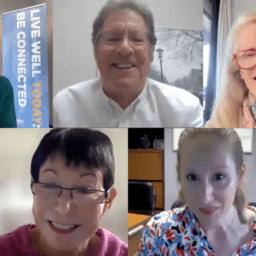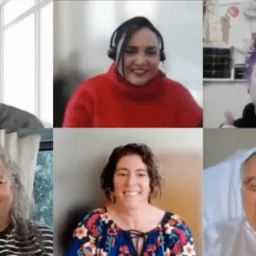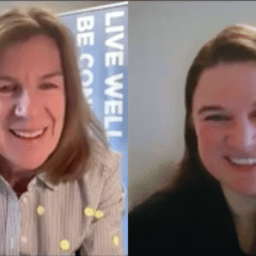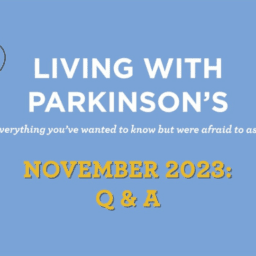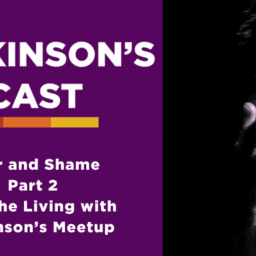Written by Connie Carpenter Phinney
During our June 2024 meetup Polly Dawkins moderated our panel of three care partners: Gail Gitin, Pat Donahoo, and me, Connie Carpenter Phinney. Gail and Pat are Ambassadors for the Foundation and can be reached here. I have been living with my person with Parkinson’s for more than 40 years and for 24 of those years, Parkinson’s has been part of our story.
We covered a lot of territory in our June Care Partner Meetup with discussions ranging from the concept of reciprocity to Pat’s travels as part of a group of cyclists with Parkinson’s crossing the country on bikes.
MEETUP NOTES
Reciprocity
Reciprocity is an important topic in any relationship–between family members as well as friends–but is sometimes lost when a person becomes mired in Parkinson’s. Gail said she hears this a lot from other care partners who feel they are doing all the heavy lifting around the home. Gail’s husband, for example, tried to be giving but in the later stages, he neglected to chip in and help as he once did. This is wearing for care partners. Some of the onus is on us to ask for help, but even that can be fatiguing. We discussed how to encourage more support and the necessity of asking for help.
One of our listeners, Mary, said she asked her person with Parkinson’s to provide acknowledgement every day for something she has done or for the ways in which she shows up. This resulted in two positive outcomes: It has helped Mary to be seen and it has helped her person understand how much she does each day. In turn, he has started to do more and be more involved.
The key takeaway: Feeling supported starts with asking.
Blame and Change
Sally, another listener, asked how to respond when your person with Parkinson’s turns the tables on you. In her case, her person blames her for things that were repeatedly communicated to him. How do you get their attention when they seem to fail to listen? Gail suggests writing note with the daily schedule or what his duties are and direct him to the note. She said this worked with her husband, relieved her of having to be repetitive with her requests, and made him more proactive.
Gail also acknowledged how her person changed through the course of the disease. We all change with time, but Parkinson’s can heighten changes in personality that make sustaining the relationship more difficult. Acknowledging this may allow you to expand your compassion for your person which, in turn, may be healing for you.
Ask for Help
Taking a quick trip away from home can be refreshing but becomes much more difficult when living with Parkinson’s. Audience member Ruth asked how it’s possible to get away for a few days when her person is incapable of taking care of themselves. Gail suggested getting away as a couple just to get a change of scenery if respite care isn’t possible.
Consider individuals or family willing to help who needed to be asked. We don’t know what’s possible until we ask and while you may think it’s ridiculous to ask, others may be grateful for a chance to step up and help. Think of a family member or a friend from work or church as examples. You won’t know what is possible unless you ask and once you do, you will have begun to build a stronger support team around you.
Thalia says her person stays with his sister when she needs to get away. Peter told us of a community grant he received to bring in respite care for his wife so he can get away.
Pat discussed how his whole neighborhood rallied around him and his wife Cydney this past spring. It started with one of the neighbors asking if he needed help after observing Cydney’s struggles and ended up with them creating a “Sunshine for Cydney” signup sheet which included bringing meals and spending time with Cyd while Pat was at work. He said he wouldn’t have thought to ask them and was amazed how they showed up. He also said it was humbling to accept this level of help but an essential ingredient to help Cyd improve.
There is a glut of scientific literature pointing to how humans are hard-wired to help each other and how much joy we derive from the practice of helping. There’s a lot of noise in our culture and false busy-ness, but our essence hasn’t changed. We want to help each other and it’s important to remember this fact when you are in need. This article explains the phenomena of “the helper’s high,” and might encourage you to find help or to help others.
This happiness calendar offers small but meaningful ways you can demonstrate self-love–something many care partners overlook or neglect to do.
The Problems With Keeping Secrets
What does a care partner do when their person with Parkinson’s refuses to tell others about their condition?
Darlene asked how she can find help when the diagnosis has been kept secret. This is unfair to the primary care partner and is part of a broader conversation that might require intervention by a trusted mediator like a physician, psychologist, chaplain, or mutual friend. As much as your person may want to keep their diagnosis secret, it’s probably obvious to others that they have something, since so many Parkinson’s symptoms are visible: masked face, stiff movements, soft voice, and tremor.
If the person with Parkinson’s is employed, they may fear workplace repercussions if their condition is known. Some of that can be mitigated by telling others what Parkinson’s is and is not. But until you disclose any of your situation, you won’t get the support you need.
Managing FallS
Gail answered a listener’s question about falling by saying this must be managed by a healthcare professional–usually a physical therapist (PT) experienced with people with Parkinson’s. You may also seek advice from your neurologist. A neuro-trained PT can help not only train the person but can evaluate and help establish more safe practices at home and away.
Many individuals with Parkinson’s suffer from neurogenic orthostatic hypotension (nOH), or being light-headed upon standing, which can lead to falls. It’s important to distinguish the root causes of the falls so this can be properly treated; nOH should be considered.
Fight for reciprocity
We closed our conversation by returning to the notion of reciprocity and how the care journey must be on a two-way street. It’s important to determine your own needs and work toward remaining or becoming healthy, connected, and able. This requires you to look outside your home to build a care team capable of helping you and your person with Parkinson’s.
Be sure to make and stick to appointments and goals. And do reach out for additional care, like finding the right psychologist or physical therapist. Pat’s capacity to bounce back from a rough spring and to be on the road this summer with a group of like-minded individuals is a great example of how reciprocity improves lives. To support his fundraising efforts–and the work we do–check out Pat’s fundraising page.
Thanks for reading. As always, our next meetup will be on the first Tuesday of next month. If you haven’t done so already, please sign up to join us for our live sessions.
See you next time!
Additional Resources
A Letter to my Newly Diagnosed Self
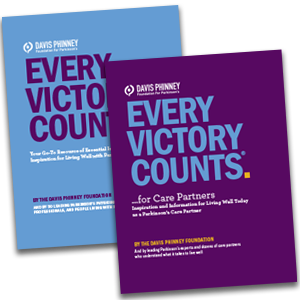 WANT MORE PRACTICAL ARTICLES LIKE THIS?
WANT MORE PRACTICAL ARTICLES LIKE THIS?
You can learn much more about living well with Parkinson’s today through our Every Victory Counts® suite of resources. Each manual is packed with up-to-date information about everything Parkinson’s. Click the link below to order your manual(s).
Thank you to our 2024 Gold Partner, AbbVie, and our Silver Partner, Mitsubishi Tanabe Pharma America, for their ongoing support of these must-have manuals. Additionally, we’d like to thank Barbara and Dale Ankenman, Abby and Ken Dawkins, Bonnie Gibbons, Irwin Narter, Lorraine and J Wilson, and Gail Gitin in loving memory of Gene Gitin for their generous donations that allow us to make these resources available and accessible to all.




